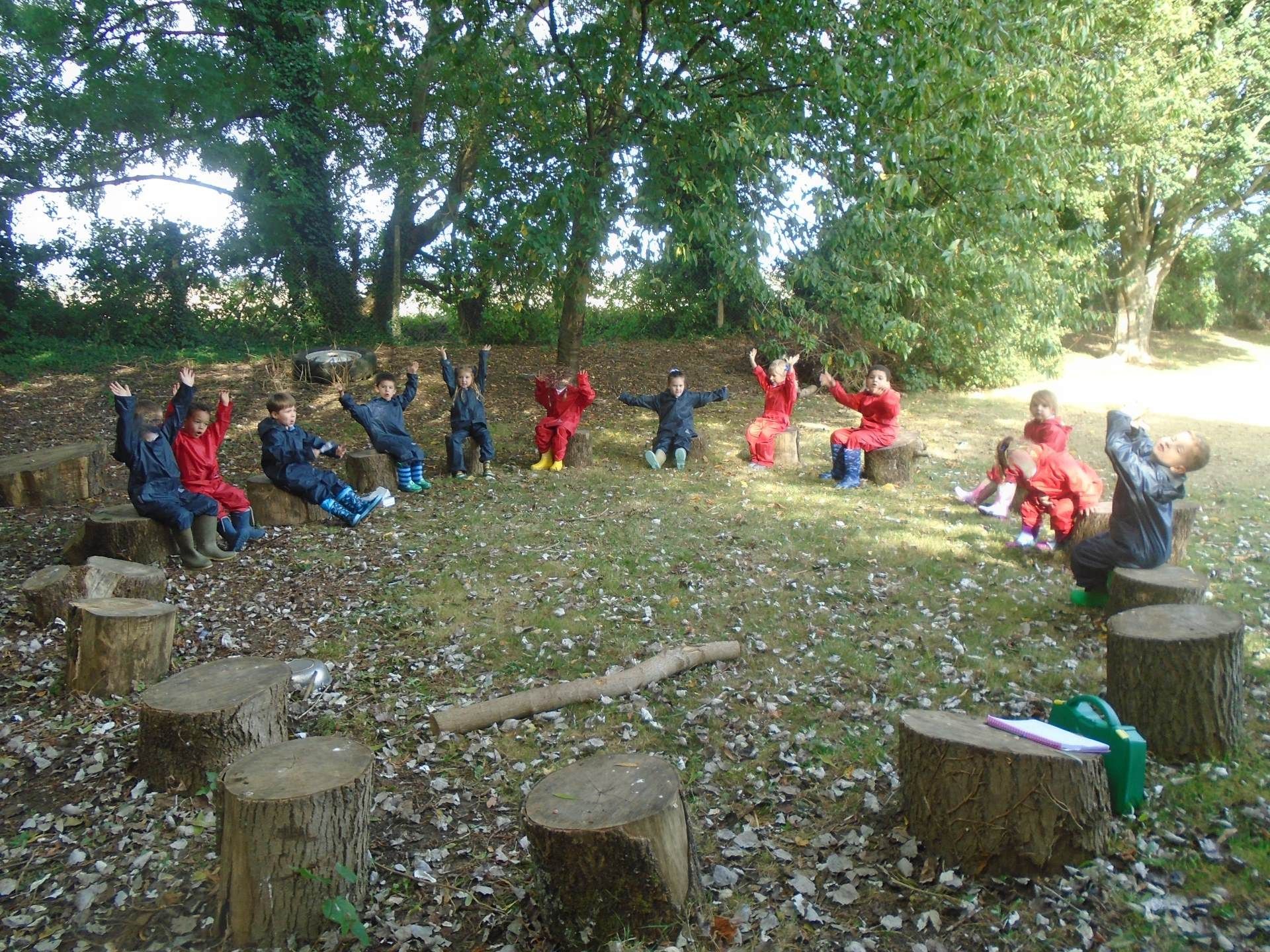
Forest School
Intent
Our established Forest School approach has developed from the Scandinavian education system and promotes the holistic development of children. It is about giving children the opportunity to take supported risks, and develop into resilient, confident, independent, and creative learners through exploring and experiencing the natural world. Our Forest School programme is tailored to meet the needs of individuals within that group and is continuously developed as the children grow in confidence, skills and understanding. Our Forest School is home to many inventions and creations.
The ethos of Forest School at Farcet C of E Primary School allows learners the time and space to develop skills, interests and understanding through practical, hands-on experiences. It also allows Educators to step back and observe the children, in order to then encourage and inspire individuals to achieve through careful scaffolding and facilitating.
At Farcet C of E Primary School children develop a connection with the natural world through the freedom to explore the outdoors and the woodland area. This is an area that is surrounded by mature trees, plants, and bushes to allow the children to be at one with nature.
Rules of Forest School are unique and different to rules of the indoor setting, to continue to allow children challenges which promote their own theories and investigations, develop curiosity, and the freedom to explore and apply skills.
Implementation
Weekly Forest School sessions are led by a trained Forest School Leader. Full risk assessments have been carried out for the learning activities. Sessions follow the children’s interests and are sequential and linked to the progression of skills and knowledge. The living woodland will aesthetically change each week. As such, learning is automatically enhanced as the outdoor environment naturally offers an environment that is informal, challenging, unpredictable and stimulating. Children experience first-hand the changing of the seasons and different weathers. Sessions happen whatever the weather, our manta ‘There is no such thing as poor weather, just inappropriate clothing.’ This allows the children the opportunity to test and maintain their curiosity of the world around them, as they explore using multiple senses. All activities are linked to the curriculum using a holistic and participative practice. Our woodland area is the ideal place for the children’s imaginations to take flight, with the space to discover. The learning and teaching strategies foster independence and develop language and communication skills and increase levels of physical activity and emotional wellbeing. Time is given to explore their thoughts, feelings and relationships, and they are encouraged to understand, appreciate, and care for the natural environment. Opportunities are provided to take risks, make choices, find new ways of learning, problem solve, initiate learning, develop practical skills, and become confident and capable learners, by giving the children challenging, but achievable tasks, and the time to reflect on this.
Skills are carefully introduced overtime, with a high level of support from Educators. The sessions allow children to reflect upon their experiences, discussing what they have achieved and what they would like to do next. Their ideas are encouraged and developed with the help of our skilful Educators during Forest School and back in the classroom. Often ideas can turn into long term research projects using many forms of expressive and creative media such as painting, drawing, clay and many more. Children are encouraged to solve problems for themselves and work collaboratively with their peers through activities such as den/shelter building, sensory walks, mud exploration, foraging, using tools for a purpose, fire building, cooking on a campfire, creating natural transient art, outdoor role play, storytelling, imaginative games, creating theories about the woodland, exploring flora and fauna, learning about habitats and keeping an eye on the wildlife within the area. We nurture a culture based on collaboration, and of embracing challenge so that we can allow, over time, for the blossoming of character, resilience, and respect, and for a greater sense of connection with nature.
Impact
We have seen a broad range of benefits from our Forest School approach which transfer into other aspects of children’s learning;
• Time in nature is proven to improve a sense of happiness and positively impact emotional wellbeing. Children who play outside laugh more, which means they're happy!
• Social development - problem solving, communicating, sharing, and learning together.
• Physical - fine and gross motor skills, movement. Physical strength and stamina develop as muscle strength improves.
• Healthy lifestyle - being outdoors and active. Children who play outdoors regularly are far more likely to be fresh-air loving, active adults, research has proven this.
• Speaking and listening skills, language development is prompted by the children’s sensory experiences.
• Opportunities for early writing and mathematics are ample.
• Understanding the world - becoming aware of the world around us and taking care of our environment. It encourages children to be naturally curious about the world around them. Playing in the woods helps children develop a life-long appreciation of nature, that we hope they carry throughout their childhood and beyond.
• Respect - children take ownership of their own area.
• Children are ‘Building Learning Power’; developing positive dispositions and attitudes such as becoming more adventurous, self-motivated, better able to understand and assess risk, learning to make safe choices, improved confidence, improved resilience, improved physical wellbeing, motor development and improved empathy through a deeper connection with the natural world.
• Challenging environments with opportunities to climb trees, balance on logs and build dens, offer children the chance to engage in ‘healthy struggles’, where their bodies and brains develop resilience, which is critical for all learning.
• The woodland area encourages group interests to develop, which are continued back inside the classroom.
• Nature provides unlimited inspiration for children to wonder and marvel about the natural world, these often-become studies of interest about wildlife, flora and fauna.

